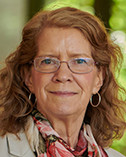
Kathleen Segerson
University of Connecticut
|
Primary Section: 64, Human Environmental Sciences Membership Type:
Member
(elected 2022)
|
Biosketch
Kathleen Segerson is an environmental economist whose research focuses primarily on applied economic theory and the incentive effects of alternative environmental policy instruments, with applications in a wide variety of contexts, including pollution control, land use regulation, marine protection, and energy efficiency. Segerson was born in Highland Park, Illinois and grew up primarily in Connecticut. She received a BA in Mathematics from Dartmouth College in 1977 and spent two years in Washington, DC working for the U.S. Congress primarily on energy-related legislation. She then attended Cornell University, where she received her PhD in environmental and resource economics from the Department of Agricultural Economics in 1984. She was on the faculty at the University of Wisconsin-Madison for a short time before joining the faculty of the Department of Economics at the University of Connecticut. She has served as President of the Association of Environmental and Resource Economists (AERE), and was named a Fellow of AERE in 2007 and a Fellow of the Agricultural and Applied Economics Association in 2008. Segerson was elected to be a member of the National Academy of Sciences in 2022.
Research Interests
Kathleen Segerson's research has focused primarily on the incentive effects of alternative environmental policy instruments. She uses economic modeling and theory to evaluate alternative policy designs and develop prescriptions for policy improvements that will provide proper incentives for individuals and organizations to engage in environmentally-protective activities. Her research has included applications in a wide range of contexts, including agricultural nonpoint source pollution, groundwater contamination, hazardous waste management, industrial pollution, workplace accidents, land use regulation, protection of marine species, and climate change. She studies both tax and regulation-based policies, as well as the use of voluntary approaches (including payments for ecosystem services) and legal liability rules imposed through statute or judicial action. Her early theoretical work showed how ambient-based approaches can be used to control nonpoint pollution, which triggered a body of experimental work designed to test the theory using laboratory and field experiments. More broadly, her work has led to the development of a general theoretical framework for studying collective policy approaches that treat groups of individuals (such as landowners or fishers) or firms (within, for example, a given location or industry) as a single entity or collective for purposes of policy implementation, an approach that has wide applicability across a variety of contexts.

